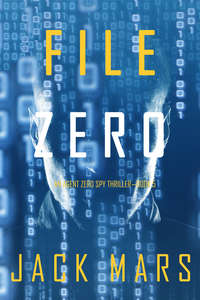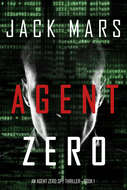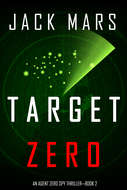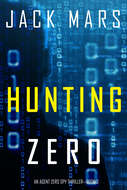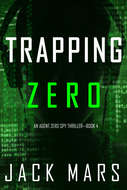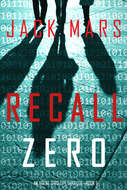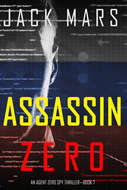Kitobni o'qish: «File Zero»
Jack Mars
Jack Mars is the USA Today bestselling author of the LUKE STONE thriller series, which includes seven books. He is also the author of the new FORGING OF LUKE STONE prequel series, comprising three books (and counting); and of the AGENT ZERO spy thriller series, comprising six books (and counting).
Jack loves to hear from you, so please feel free to visit www.Jackmarsauthor.com to join the email list, receive a free book, receive free giveaways, connect on Facebook and Twitter, and stay in touch!
Copyright © 2019 by Jack Mars. All rights reserved. Except as permitted under the U.S. Copyright Act of 1976, no part of this publication may be reproduced, distributed or transmitted in any form or by any means, or stored in a database or retrieval system, without the prior permission of the author. This ebook is licensed for your personal enjoyment only. This ebook may not be re-sold or given away to other people. If you would like to share this book with another person, please purchase an additional copy for each recipient. If you’re reading this book and did not purchase it, or it was not purchased for your use only, then please return it and purchase your own copy. Thank you for respecting the hard work of this author. This is a work of fiction. Names, characters, businesses, organizations, places, events, and incidents either are the product of the author’s imagination or are used fictionally. Any resemblance to actual persons, living or dead, is entirely coincidental.
BOOKS BY JACK MARS
LUKE STONE THRILLER SERIES
ANY MEANS NECESSARY (Book #1)
OATH OF OFFICE (Book #2)
SITUATION ROOM (Book #3)
OPPOSE ANY FOE (Book #4)
PRESIDENT ELECT (Book #5)
OUR SACRED HONOR (Book #6)
HOUSE DIVIDED (Book #7)
FORGING OF LUKE STONE PREQUEL SERIES
PRIMARY TARGET (Book #1)
PRIMARY COMMAND (Book #2)
PRIMARY THREAT (Book #3)
AN AGENT ZERO SPY THRILLER SERIES
AGENT ZERO (Book #1)
TARGET ZERO (Book #2)
HUNTING ZERO (Book #3)
TRAPPING ZERO (Book #4)
FILE ZERO (Book #5)
RECALL ZERO (Book #6)
TRAPPING ZERO (Book #4) – Summary
A new threat rises to power that threatens to shake the foundation of America to its core. It’s up to CIA Agent Kent Steele to pull at the threads and unravel the brilliant but deadly master plan before it is executed—all while staying out of the line of fire of those who want him dead.
Agent Zero: Though he was unable to stop the Brotherhood from destroying the Midtown Tunnel in New York, Agent Zero successfully ended the terrorist organization and helped save thousands of lives. During a clandestine award ceremony at the White House, his lost memories suddenly returned to him all at once—including his knowledge about the war conspiracy.
Maya and Sara Lawson: Now that they know what their father is and does, Zero’s daughters understand that they are viable targets for those trying to get to him. However, they refuse to become victims again, displaying intelligence and tenacity far beyond their age.
Agent Maria Johansson: Maria continues to work with the Ukrainians despite Zero’s insistence that she break ties. Though stopping the war is crucial to her, she is equally determined to find out if her father, a high-ranking member of the National Security Council, is involved in the government conspiracy—and if not, what might become of him if he doesn’t relent.
Agent Todd Strickland: The young CIA agent and former Army Ranger was stunned to learn of the government plot from his friend Agent Zero, but now that he knows, he is as resolute as anyone to help put an end to it and keep innocent people from needlessly dying.
Dr. Guyer: The brilliant Swiss neurologist that initially installed the memory suppressor in Agent Zero’s head attempted to bring the memories back with a machine of his own invention. He believed the process had failed, and is unaware that Zero’s memories have belatedly returned.
Agent Talia Mendel: The Israeli Mossad agent helped put a stop to the Brotherhood’s plot in both Haifa and New York. Though unaware of the conspiracy, Mendel makes no attempt to hide her appreciation for, and attraction to, Agent Zero, willing to help in any capacity she’s able.
Fitzpatrick: The leader of the “private security force” known as the Division, Fitzpatrick was sent after Agent Zero by Deputy Director Ashleigh Riker in an effort to stall him in New York. Fitzpatrick was struck by a car driven by Talia Mendel, his fate largely unknown.
CHAPTER ONE
I am Agent Zero.
He had already known it, at least for the past few months, ever since the memory suppressor had been violently ripped from his skull by the trio of Iranian terrorists working for Amun. But this… this was different from just knowing. It was an awareness, a sense of being and belonging that had come on as swiftly as a heart attack, and equally pernicious.
“Agent Zero?” said President Eli Pierson. “Do you need to sit?”
Reid Lawson stood in the Oval Office, the President of the United States standing before him with a smile on his lips but puzzlement in his eyes. In his hands, the president held a polished wooden box of dark cherry. The lid was open; nestled in a small pillow of velvet was the Distinguished Intelligence Cross, the highest award the CIA could give.
Only a minute earlier, Reid could not recall ever having visited the White House before. But now he recalled it all. He had been here several times, clandestine meetings just like this one, so the president could commend him on a job well done.
Less than a minute earlier, the president had said, “I’m so sorry. Director Mullen, is this the Intelligence Cross, or the Star? I can’t seem to keep them straight.”
And that was when it happened. That single word had triggered it all:
Straight.
That word stuck in Reid’s mind and lodged there, sending an electric tingle up his spine.
Strait.
And then the floodgates opened suddenly and without warning. It felt as if an intruder had shouldered open the door to his brain, forced his way in, and made it his new home. Quick as a bolt of lightning, he remembered.
He remembered everything.
Hunting terrorists in the Gaza Strip. Apprehending bomb makers in Kandahar. Midnight raids on compounds. Briefings, debriefings, weapons training, combat training, flight lessons, languages, interrogation tactics, rapid intervention… In half a second, the dam in Reid Lawson’s limbic system broke and Agent Zero surged through. It was too much, far too much to process that quickly. His knees threatened to buckle and his hands trembled. He slumped; Maria’s arms caught him before he hit the carpet.
“Kent,” she said quietly but urgently. “Are you all right?”
“Yeah,” he murmured.
I need to get out of here.
“I’m okay.”
I’m not okay.
“It’s, uh…” He cleared his throat and forced himself to stand again, albeit shakily. “It’s just the pain medication, for my hand. Made me a bit woozy. I’m okay.” His right hand was wrapped in layers of metal braces, gauze, and tape, after the terrorist Awad bin Saddam had crushed it with the anchor of a motorboat. Nine of the twenty-seven bones in his hand were broken.
And even though there had been a throbbing pain only a minute ago, he now felt nothing.
President Pierson smiled. “I understand. No one here will be offended if you sit.” The president was a charismatic man, young for the office at only forty-six and nearing the end of his first term. He was an excellent orator, praised by the middle class, and he had been a friend to Zero. Now he knew it to be true: his memories told him.
“Really. I’m okay.”
“Good.” The president nodded and lifted the dark cherry box in his hands. “Agent Zero, it is my great honor and genuine pleasure to give you this Distinguished Intelligence Cross.”
Reid nodded, forcing himself to stand straight, to keep himself steady as Pierson presented the gold, three-inch-round medal nestled inside the box. He handed it to Reid gently and Reid took it.
“Thank you. Um, Mr. President.”
“No,” said Pierson. “Thank you, Agent Zero.”
Agent Zero.
The room broke out into light applause and Zero looked up quickly, bewildered; he had nearly forgotten there were other people in the Oval Office. Standing to the left of Pierson’s desk was Vice President Cole, and beside him were the Secretaries of Defense, Homeland Security, and State. Opposite them were Christopher Poe, head of the FBI, Governor Thompson of New York, and Director of National Intelligence John Hillis.
Beside the DNI was Zero’s own boss, CIA Director Mullen, his hands making a show of clapping but hardly emitting any noise. His bald head, ringed with gray hair, gleamed under the lights. Deputy Director Ashleigh Riker was beside him in her usual uniform of a charcoal gray pencil skirt and matching blazer.
He knew about them. These people who were applauding him, he had gathered intelligence on nearly every single one of them that suggested they were involved in the plot. The knowledge came to him as if it had always been there. The Secretary of Defense, retired general Quentin Rigby; Vice President Cole; even DNI Hillis, the only man other than President Pierson that Mullen answered to. Not one among them was innocent. They were not to be trusted. They were all involved.
Two years ago, Zero had discovered the plot, or at least part of it, and he had been building a case. While interrogating a terrorist at the black site H-6 in Morocco, Zero had stumbled upon a conspiracy for the United States to manufacture a war in the Middle East.
The strait—that was the trigger. The intention was for the US to gain control of the Strait of Hormuz, a narrow waterway between the Gulf of Oman and Iran, a global thoroughfare for oil shipping and one of the most strategic maritime chokepoints the world over. It was no secret that the United States had a substantial presence in the Persian Gulf, an entire fleet, and it was all for one reason: to protect their interests. And their interests boiled down to a single resource.
Oil.
That’s what this was about. That’s what it had always been about. Oil meant money, and money meant that the people in power got to stay in power.
The Brotherhood’s attack on New York City was the catalyst. A large-scale terrorist attack was just the provocation the government needed not only to justify a war, but to rally the American people to the side of abject patriotism. They had seen it work before with the attack on September 11, and had been keeping the notion in their back pocket until they needed it again.
Awad bin Saddam, the young leader of the Brotherhood who believed he had orchestrated the attack, had been a pawn. He had unwittingly been led to the conclusions he thought he had drawn himself. The Libyan arms dealer that had supplied the terrorists with submersible drones was undoubtedly a liaison between the US and the Brotherhood. But there was no way to prove that now; the Libyan was dead. Bin Saddam was dead. Anyone who might be able to substantiate Zero’s belief was dead.
Now the catalyst had happened. Even though Zero and his small team had thwarted the large-scale loss of life that bin Saddam had hoped for, hundreds had been killed and the Midtown Tunnel was lost. The American people were outraged. Xenophobia and hostility toward Middle Easterners was already running rampant.
Two years ago, he thought he had time to build a case, to gather evidence—but then came Amun, Rais, and the memory suppressor. Now, he was out of time. The men surrounding him, applauding him, these heads of state and government captains, were about to start a war.
But this time around, Zero wasn’t alone.
To his left, standing in a line beside him in front of the president’s desk, were the people that he counted among friends. Those he could trust; or rather, those he believed he could trust.
John Watson. Todd Strickland. Maria Johansson.
Watson’s real name is Oliver Brown. Born and raised in Detroit. Lost his six-year-old son to leukemia three years ago.
Maria’s real name is Clara. She told you that after your first night together, during your tryst. After Kate died.
No. After Kate was murdered.
My god. Kate. The memory struck him like a hammer to the head. She had been poisoned with a powerful toxin that caused respiratory and cardiac failure as she walked to her car after work one day. Zero had always believed it was the work of Amun and their top assassin, but Rais’s dying words had been but three letters.
C-I-A.
I need to get out of here.
“Agents,” said President Pierson, “I thank you once again on behalf of the American people for your service.” He flashed a winning smile at the four of them before addressing the entire room. “Now, we have an excellent luncheon prepared in the State Dining Room, if you’ll all indulge me. Right this way—”
“Sir,” Zero spoke up. Pierson turned to him, the smile still on his lips. “I appreciate the offer, but if it’s all the same to you, I, uh, really think I should get some rest.” He held up his right hand, wrapped thick as a catcher’s mitt. “My head is swimming from the medication.”
Pierson nodded deeply. “Of course, Zero. You deserve some rest, some time with your family. Although it feels a bit odd to hold a reception without a guest of honor, I doubt this will be the last time we see each other.” The president grinned. “This must be, what, the fourth time we’ve met like this?”
Zero forced a smile of his own. “Fifth, if I’m not mistaken.” He shook the president’s hand once more, awkwardly, with his uninjured left. As he left the Oval Office, escorted by two Secret Service agents, he couldn’t help but notice in his periphery the expressions on Rigby’s and Mullen’s faces.
They’re suspicious. Do they know I know?
You’re being paranoid. You need to get out of here and focus.
It wasn’t paranoia. As he followed the two black-suited agents down the corridor, an alarm rang out in his head. He realized what he had just done. How could you be so careless! he scolded himself.
He had just admitted, in front of the entire Oval Office of conspirators, that he remembered precisely how many times he’d been commended personally by Pierson.
Maybe they didn’t notice. But of course they did. By stopping the Brotherhood, Zero had made it clear that he was the top obstacle that stood in their way. They were aware that Zero knew things, at least partially. And if they suspected even for a moment that his memory had returned, he would be watched even more carefully than he’d been before.
All that meant to him was that he had to move faster than they did. The men he left behind in the Oval Office were already enacting their plan, and Zero was the only person who knew enough to stop them.
*
Outside it was a beautiful spring day. The weather was finally turning; the sun felt warm on his skin and the dogwood trees on the White House lawn had just begun to sprout small white flowers. But Zero hardly noticed. His head was spinning. He needed to get away from the influx of stimuli so he could process all this sudden information.
“Kent, wait up,” Maria called out. She and Strickland hurried after him as he strode toward the gates. He wasn’t heading to the parking lot, or back to the car. He wasn’t sure where he was going at the moment. He wasn’t sure of anything. “You sure you’re okay?”
“Yeah,” he muttered, not slowing. “Just need some air.”
Guyer. I have to contact Dr. Guyer and tell him that the procedure worked belatedly.
No. Can’t do that. They might have your phones tapped. Your email too.
Have I always been this paranoid?
“Hey.” Maria grabbed him by the shoulder and he spun to face her. “Talk to me. Tell me what’s going on.”
Zero stared into her gray eyes, noted the way her blonde hair fell around her shoulders in waves, and the memory of them together whirled through his head again. The feel of her skin. The shape of her hips. The taste of her mouth on his.
But there was something else there too. He recognized it as a stabbing pang of guilt. Kate hadn’t been killed yet. Did we… did I…?
He shook the thought from his head. “Like I said. It’s the meds. They’re just really messing with my head. I can’t think straight.”
“Let me drive you home,” Strickland offered. Agent Todd Strickland was only twenty-seven, but had an impeccable track record as an Army Ranger and had quickly made the transition to the CIA. He still wore a military-style fade cut over a stocky neck and muscled torso, though he was simultaneously gentle and approachable when the situation called for it. Most importantly, he had been a friend in more than one time of need.
And while Zero recognized that, at the moment he needed to be alone. It felt impossible to think straight with anyone talking to him. “No. I’ll be fine. Thanks.”
He tried to turn again, but Maria reached for his shoulder once more. “Kent—”
“I said I’m fine!” he snapped.
Maria did not recoil at his outburst, but narrowed her eyes slightly as her gaze bored into his, searching for some understanding.
The memory of their tryst came again, involuntarily, and he felt heat rise in his face. We were on an op. Holed up in some Greek hotel. Waiting for instructions. She seduced me. I was weak. Kate was still alive. She never knew…
“I have to go.” He took a few steps backward to make sure that neither of his fellow agents would attempt to pursue him again. “Don’t follow me.” Then he turned and strode away, leaving them standing there on the White House lawn.
He had very nearly reached the gates before he felt the presence behind him, heard the shifting of footsteps. He spun quickly. “I told you not to—”
A short woman with shoulder-length brunette hair stopped in her tracks. She wore a navy blue blazer and matching slacks with heels, and she raised an eyebrow as she regarded Zero curiously. “Agent Zero? My name is Emilia Sanders,” she told him. “Aide to President Pierson.” She held out a white business card with her name and number on it. “He wants to know if you’ve reconsidered his offer.”
Zero hesitated. Pierson had previously offered him a spot on the National Security Council, which had made him suspicious of the president’s involvement, but it seemed as if the offer was genuine.
Not that he wanted it. But still he took her card.
“If you find you need anything at all, Agent Zero, please don’t hesitate to give a call,” Sanders told him. “I’m quite resourceful.”
“I could use a ride home,” he admitted.
“Certainly. I’ll get someone for you immediately.” She pulled out a cell phone and made a call while Zero stuffed the business card in his pocket. Pierson’s offer was the furthest thing from his mind. He had no idea how much time, if any, he had in which to act.
What do I do? He squeezed his eyes shut and shook his head, as if trying to dislodge an answer.
726. The number spun quickly through his mind. It was a safe deposit box at a bank in downtown Arlington where he had been keeping records of his investigations—photos, documents, and transcriptions of phone calls from those leading this secret cabal. He had paid for five years upfront on the deposit box so that it wouldn’t go dormant.
“Right this way, Agent.” The presidential aide, Emilia Sanders, gestured for him to follow as she led him briskly toward a garage and a waiting car. As they walked, Zero thought again of the suspicious looks from General Rigby, from Director Mullen. It was paranoia, nothing more—at least he tried to tell himself that. But if there was even a chance that they knew he was on to them, they would come after him with everything they had. And not just him.
Zero made himself a mental checklist:
Get girls safe.
Retrieve contents of safe deposit box.
Stop war before it starts.
All Zero had to do was figure out how to stop a group of the most powerful men in the world, with some of the deepest pockets, who had been planning this event for more than two years, had the backing of almost every government agency the United States had to offer, and had everything to lose.
Just another day in the life of Agent Zero, he thought sourly.
CHAPTER TWO
Aboard the USS Constitution, Persian Gulf
April 16, 1830 hours
The furthest thing from Lieutenant Thomas Cohen’s mind was war.
As he sat at a radar array aboard the USS Constitution, watching the small blips as they meandered lazily across the screen, he was thinking about Melanie, his girlfriend back home in Pensacola. It was just under three weeks to go before he would rotate home. He already had the ring; he’d purchased it a week earlier on a day pass to Qatar. Thomas doubted there was anyone on the ship he hadn’t proudly shown it to yet.
The sky over the Persian Gulf was clear and sunny, not a single cloud, but Thomas wouldn’t get to enjoy it, tucked away in a corner of the bridge as he was, the thick armored port windows obscured by the radar console. He couldn’t help but feel mildly jealous of the ensign out on the deck that he communicated with by radio, the younger man holding a line-of-sight visual on the ships that, to Thomas, were just blips on the screen.
Sixty billion dollars, he thought with grim amusement. That’s how much the United States spent annually to keep a presence in the Persian Gulf, the Arabian Sea, and the Gulf of Oman. The US Navy’s Fifth Fleet called Bahrain its headquarters, and was comprised of several task forces with specific patrol routes along the coasts of North Africa and the Middle East. The Constitution, a destroyer-class ship, was part of Combined Task Force 152, which patrolled the Persian Gulf from the northern end all the way to the Strait of Hormuz, between Oman and Iran.
Thomas’s friends back home thought it was so cool that he worked on a US Navy destroyer. He let them believe that. But the reality was simply a strange, if not somewhat boring and repetitive, existence. He sat upon a modern marvel of engineering, outfitted with the highest of tech and armed with enough weaponry to devastate half a city, yet their entire purpose basically boiled down to what Thomas was doing at the very moment—watching blips on a radar screen. All that firepower and money and men amounted to a glorified what-if situation.
That wasn’t to say there was never any excitement. Thomas and the other guys who had been around for a year or longer got their kicks from watching how nervous the FNGs would get, the newcomers, the first time they heard that the Iranians were going to fire on them. It didn’t happen every day, but it was frequent enough. Iran and Iraq were dangerous territories, and they had to at least keep up appearances, Thomas supposed. Every now and then the Constitution would get a threat from the Navy of the Islamic Revolutionary Guard Corps, Iran’s maritime force in the Persian Gulf. The ships would sail a little close for comfort, and sometimes—on the particularly exciting days—they’d fire off a few rockets. Usually they fired in the complete opposite direction of any US ships. Posturing, Thomas thought. But the FNGs would just about piss themselves over it, and they’d be the butt of the joke for a few weeks after.
The trio of blips on the screen moved ever closer to their location, approaching from the northeast. “Gilbert,” said Thomas into the radio, “how are we looking up there?”
“Oh, it’s a beautiful afternoon. About seventy-four and sunny,” Ensign Gilbert said through the radio, doing his best to keep the laughter out of his voice. “Humidity’s low. Wind is maybe five miles an hour. If I close my eyes, it feels like Florida in early spring. How y’all doing in there?”
“Jackass,” muttered Lieutenant Davis, the communications officer, seated near Thomas at the radar array. He smirked and said into the radio, “Sorry, Ensign Gilbert? Can you repeat that for your lieutenant?”
Thomas chuckled as Gilbert let out a soft groan. “All right, all right,” said the young man from the top deck. “I’ve got visual on three IRGC ships to the northeast, traveling at about fourteen knots or so and looking to be a little more than a half mile out.” Then he quickly added, “Sir.”
Thomas nodded, impressed. “You’re good. They’re at point-five-six. Anyone want to take some action on this?”
“I’ve got a fiver that says they veer off by point-four,” said Davis.
“I’ll see that and raise,” said Petty Officer Miller behind them, swiveling around in his chair. “Ten bucks says they reach point-three. You in, Cohen?”
Thomas shook his head. “Hell no. Last time you guys took me for twenty-five bucks.”
“And he’s got a wedding to save up for,” Davis chided with a nudge.
“Y’all are thinking small,” Gilbert said in the radio. “These guys are cowboys, I can feel it. A certain Mr. Jackson says not only do they come within point-two-five, but we get an Iranian dick pic.”
“Don’t be crass,” Davis scolded Gilbert for his lewd metaphor of the IRGC firing off a rocket.
“That’d be a nice change of pace,” Miller muttered. “Most exciting thing that’s happened around here in two weeks was enchilada day.”
It was not at all lost on Lieutenant Cohen that an outside observer might have thought it insane for them to be making small wagers on whether or not a ship fired a missile. But after so many so-called confrontations yielding nothing, it was hardly anything to fret over. Besides, the US rules of engagement were clear; they would not fire unless directly fired upon first, and the Iranians knew that. The Constitution was exactly as its class implied: a destroyer. If a rocket fell close enough for them to feel the heat of it, they could obliterate the IRGC ship in seconds.
“Point-four and closing,” Thomas announced. “Sorry, Davis. You’re out.”
He shrugged. “Can’t win ’em all.”
Thomas frowned at the array. It looked as if the two ships flanking either side of the third were veering, but the central ship continued on a straight path. “Gilbert, check visual.”
“Aye aye.” There was a moment of silence before the ensign reported back. “Looks like two of the ships are breaking off, south-southeast and south-southwest. But I think that third boat wants to be friends. What did I tell you, Cohen? Cowboys.”
Miller sighed. “Where is Captain Warren? We should alert—”
“Captain on the bridge!” a sharp voice bellowed suddenly. Thomas hopped up from his seat and issued a crisp salute, along with the four other officers in the control room.
The XO entered first, a tall and square-jawed man who looked a lot more serious than he usually came off as. He was followed by a hasty Captain Warren, his slight paunch straining the lowest buttons of his tan short-sleeved shirt. On his head he wore a Navy baseball cap, the dark blue looking almost black in the dim lighting of the bridge.
“As you were,” Warren said gruffly. Thomas slowly took his seat again, exchanging a concerned glance with Davis. The captain was likely aware of the approaching IRGC ships, but for him to be here with three boats looming so close meant that something was going on. “Listen up and listen good, because I’m going to say this quick.” The captain frowned deeply. He normally wore a frown—Thomas couldn’t recall ever seeing Warren smile—but this frown seemed particularly dismayed. “Orders have just come down the pipe. There’s been a change in ROE. Any ships that fire within a half-mile proximity are to be considered hostile and dealt with using extreme prejudice.”
Thomas blinked at the sudden rush of words, failing to comprehend at first.
Petty Officer Miller forgot himself for a moment as he said, “Dealt with? You mean destroyed?”
“That’s right, Miller,” said Captain Warren as he locked eyes with the young man, “I mean destroyed, demolished, obliterated, devastated, wrecked, and/or ruined.”
“Um, sir?” Davis spoke up. “If they fire at all? Or if they fire upon us?”
“The release of a weapon that could result in a loss of life, Lieutenant,” Captain Warren told him. “Whether aimed at us or not.”
Thomas couldn’t believe what he was hearing. The IRGC had fired rockets plenty of times since he had been aboard the Constitution, many of those times within a half mile of them. He found it exceedingly bizarre and coincidental that the rules of engagement would be changed so swiftly—and at the precise moment when an Iranian ship was bearing down on them.
“Look,” said Warren, “I don’t like this any more than you do, but you all know what happened. Frankly, I’m surprised it took the government this long. But here we are.”
Thomas knew precisely what the captain was referring to. Mere days earlier, a terrorist organization had attempted to blow up the USS New York, an Arleigh-Burke destroyer that was moored at the Port of Haifa in Israel. And only two days ago, the same insurgent cell had taken out an underwater tunnel in New York City. Captain Warren had convened the entire crew in the mess hall to tell them the dire news. The CIA had caught wind of the attack just hours before it was carried out and managed to save a lot of lives, but hundreds had still perished and far too many were yet unaccounted for. The scale of the attack was not nearly that of 9/11, but it was still one of the most substantial attacks on US soil in the last hundred years.
“This is the world we live in now, boys,” said Warren, shaking his head in disdain. Clearly he was thinking the same thing as Thomas. They all were.
“It’s veering off,” said Gilbert through the radio, jarring Thomas out of his thoughts and back to his console. The ensign was right; the third ship was just shy of point-three miles and steering toward the west. “Looks like I’ll be out twenty bucks.”
Thomas let out a sigh of relief. In another minute the ship would be gone, beyond a half-mile range, and the Constitution would continue its easterly patrol route toward the strait. Please don’t do anything stupid, he thought as he said, “IRGC cruiser is at point-two-eight, veering east. Doesn’t look like it’s interested in us, sir.”
Warren nodded, though if he was as glad as Thomas, he didn’t show it. The lieutenant could guess why; the rules of engagement had changed, and quite suddenly at that. How long would it be before they found themselves in another situation like this one?
